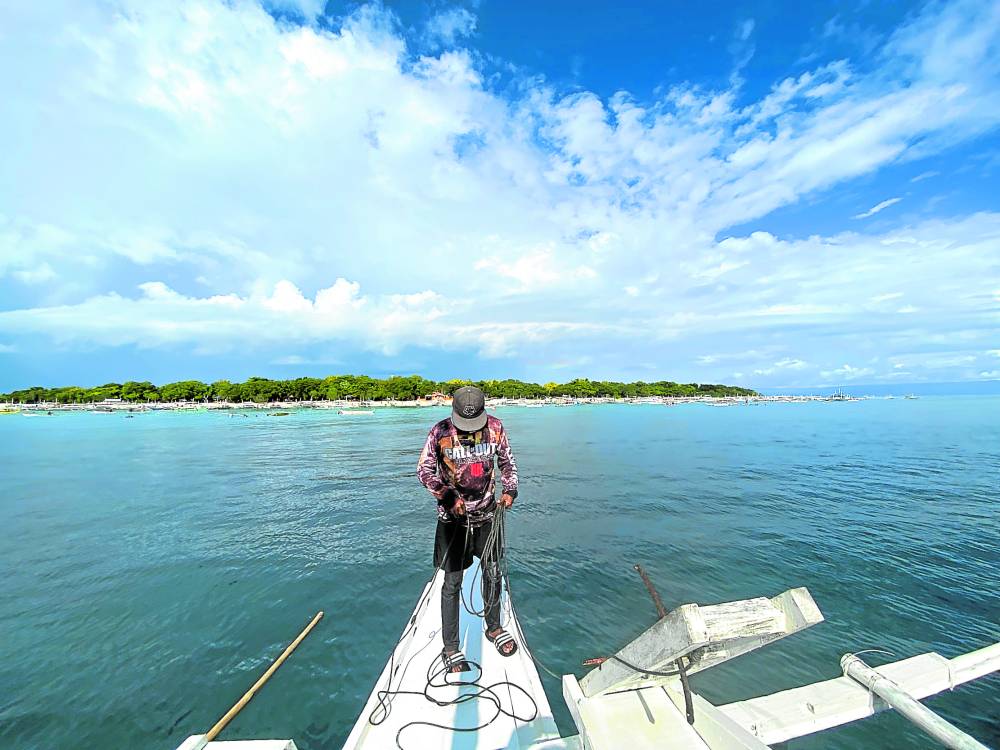Whale sharks unwelcome in another Bohol town

RICH WATERS A boat helper prepares to dock on Balicasag Island in Panglao, Bohol, in this photo taken in August last year. Bohol is famous for its diving spots, coral gardens and its dolphins, whales, sea turtles and whale sharks that attract tourists. But several fishing communities in the province, like those in Loay and Alburquerque towns, consider whale sharks as threats to their livelihood as they blame these sea creatures for the decline in their fish catch. —ROBERT JAWORSKI L. ABAÑO
TAGBILARAN CITY — Fishermen in Alburquerque, Bohol, have complained about the presence of whale sharks, locally known as “tuki-tuki” or “butanding,” in their waters, echoing the sentiments of those in Loay town about the marine creatures’ impact on their livelihood.
“They have done a lot of damage to us fishermen,” said a fisherman who wanted to be identified only as Benjie, over fears of reprisal by the local government.
Benjie said his group monitored three to five whale sharks feeding in Alburquerque’s waters recently.
On Wednesday, fisherfolk in the neighboring town of Loay expressed disgust over the presence of the giant sea creatures.
Whale sharks, the biggest fish in the ocean, on average grow to 5.48 meters to 9.9 meters (18 feet to 32.5 feet) long, approximating the size of a school bus.
Article continues after this advertisementThese creatures pass through the waters off Jagna, Lila, Loay, Alburquerque and Baclayon towns. Lately, they have been staying off Loay and Alburquerque after locals observed that two men were feeding them daily.
Article continues after this advertisementEnvironmentalists have criticized the practice of feeding whale sharks as these these sea creatures are highly migratory (traveling long distances) and must not be encouraged to stay in one place.
Benjie said they preferred that whale sharks feed in the waters off the islands of Pamilacan and Panglao, where these creatures are welcomed by locals and tourists.
Pamilacan is in Baclayon town, some 17 kilometers southeast of the bigger Panglao Island. Fishermen in Pamilacan used to hunt dolphins, whales, whale sharks and manta rays but the these sea creatures have since been protected by Philippine environmental laws.
Not ‘gentle giants’
Benjie said whale sharks were nothing but “disruptions” in Alburquerque town. One time, he said, whale sharks destroyed his pumpboat.
“In my observation, they are not gentle giants. They are even fearful to behold, especially its colossal gaping mouths,” he said.
Benjie said before the whale sharks arrived in Alburquerque, he was catching 10 big pails of “bolinaw” (anchovy), with each containing 90 kilos, daily.
“Now, we are content with having just 10 kilos [of anchovy],” he lamented.
Another fisherman, Jhay, said he learned that their fellow fishermen in Lila, Bohol, and Oslob, Cebu, had stopped fishing and shifted to tourism activities to earn a living due to the presence of whale sharks in their waters.
However, he said these fishermen could still not earn more than the minimum wage.
“It is still cruel to put these whale sharks in just one place. They should instead be allowed to roam freely,” said Jhay.
He said fishermen in Alburquerque will join their counterparts in Loay in expressing their sentiments to the provincial board about the presence of whale sharks in their communities.